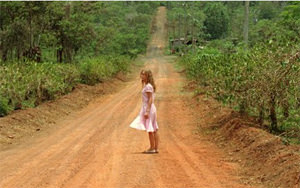‘White Material’: Portrait of the Colonist in a Post-Colonial Land
The predominant image of this film—repeated in a dozen variants—is of a lone woman walking or driving the empty roads of this beautiful, unnamed country, seeking a salvation that is both practical and spiritual.The predominant image of this film is of a lone woman walking or driving the empty roads of this beautiful, unnamed country, seeking a salvation that is both practical and spiritual.
In a post-colonial, pre-revolutionary African country, the French peacekeepers are pulling out and government troops are contending for control of the rapidly failing nation with a rebel leader known as The Boxer, whose troops are largely child soldiers. Wounded, The Boxer has taken refuge in a coffee plantation owned by the Vials and managed by Maria (a muscular Isabelle Huppert), who is determined to hang on to the acreage despite the increasingly desperate conditions she confronts.
Director Claire Denis’ “White Material” tells her story in a jumpy jumble of narrative leaps that at first annoys and then absorbs the viewer. Another, perhaps lesser, director would probably have done her best to clarify the confusions of this story; instead, Denis embraces them. The predominant image of this film—repeated in a dozen variants—is of a lone woman walking or driving the empty roads of this beautiful, unnamed country, seeking a salvation that is both practical and spiritual.
It is time to harvest her crop and her workers have fled the plantation. Therefore, her first order of business is to replace them. This she briefly manages to do, although her new crew also decamps almost immediately. For allies she is pretty much reduced to a feckless former husband and a “half-baked” son (as someone describes him)—a lad who may merely be afflicted with adolescent angst, but who is more likely on his way to becoming a full-scale nut job.
We never quite understand why saving the plantation is so important to Maria. Yes, the family has lived there for a couple of generations, And, yes, we understand that she cannot imagine any other life for herself. On the other hand, it has been years since they turned a profit on their crop, and the old colonial life style that once sustained them is long gone. To remain in place is to assure an absurd and anonymous extinction—the machete at midnight, the rape by the roadside.
A couple of times Maria reflects on the beauty of the landscape. But that scarcely seems sufficient reason to wage this hopeless fight. She is, we come to see, stubborn simply because that is her nature. Caught up in the practical details of her struggle, she cannot pause to contemplate the larger meaning—if any—of what she is doing. She is, you might say, morally mute. Racing hither and tither, improvising this or that solution to whatever practical problem presents itself, she has no time for irony, let alone long, long thoughts.
Therein lies the rough beauty of this film. The hills may be alive with menace—child soldiers shooting off their guns, rebel and government troops ready to kill for no good reason—but Huppert’s character, as sinewy in spirit as she is in physical appearance, just keeps plowing on. Never once does she openly acknowledge the peril that surrounds her. She seems to feel that if she just keeps busy she is impervious to threat.
Eventually one comes to think she represents that curious sense of exceptionalism that has led to so many modern tragedies—not only in the colonial world, but elsewhere as well. “White Material” never mentions it, but Maria is, in effect, shouldering the White Man’s Burden. She has the energy, the intelligence—and the blindness—to dominate a vastly larger and infinitely more chaotic civil population. But she cannot recognize that it would require only a few—well, yes, “half-baked”—organizing ideas for the restive natives to casually, heedlessly exterminate her.
Her only real option is to run. This was true in Nazi Germany, in Kenya or Rwanda, dozens of other post-colonial contexts as well. But people do not exercise that choice. They think the ugliness must only be temporary. They rely on their pride of place in the pecking order. They are full of an unrecognized hubris. And so they die. The last we see of Maria is her standing alone in open country, at the end of her tether, but perhaps not fully realizing, even then, that she has reached that point.
“White Material” is a difficult, narratively thorny, film. But in Huppert’s uncompromising performance—she never once appears to harbor an abstract or idealistic thought or one that we would feel comfortable sentimentalizing — and in Denis’ refusal to embrace easy, uplifting answers to an insoluble problem, it offers us a portrait of an exemplary, persistent (and, in a certain sense, tragic) figure. For Maria Vial is the victim of a spirit too primitive, too animalistic, to be the avatar of a new, somewhat better society. She will, we are sure, die the victim of blind forces that can only make a bad place even worse—more brutal, more irrational — than it already is.
Your support matters…Independent journalism is under threat and overshadowed by heavily funded mainstream media.
You can help level the playing field. Become a member.
Your tax-deductible contribution keeps us digging beneath the headlines to give you thought-provoking, investigative reporting and analysis that unearths what's really happening- without compromise.
Give today to support our courageous, independent journalists.






You need to be a supporter to comment.
There are currently no responses to this article.
Be the first to respond.